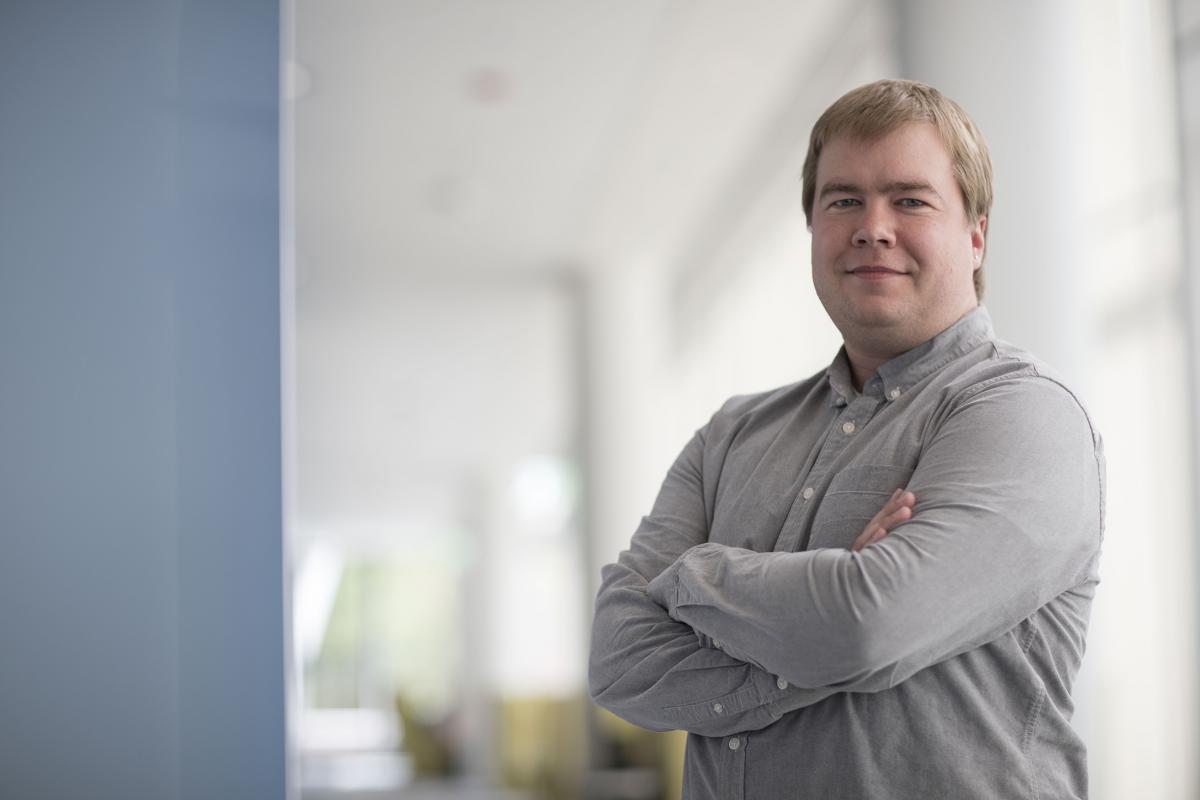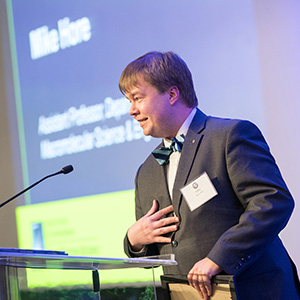Physics
Alumnus Spotlight — Dr. Michael Hore

Featuring Alumni from the University of Memphis
Department of Physics and Materials Science
Michael J. A. Hore is an associate professor in the Macromolecular Science & Engineering department at Case Western Reserve University. Dr. Hore earned his BS degree in Physics/Mathematical Science at The University of Memphis and later his MS degree in Physics at The University of Memphis in 2007. He received his PhD in Materials Science & Engineering from the University of Pennsylvania in 2012 and was awarded a National Research Council (NRC) Postdoctoral Fellowship to perform neutron scattering measurements at the NIST Center for Neutron Research (NCNR) from 2012-2014. Recently, he has been recognized with several teaching awards, an NSF CAREER Award, the DPOLY/UKPPG Lecture Exchange Award from the American Physical Society (APS), and was named a 2018 PMSE Young Investigator by the American Chemical Society (ACS). His research group combines theory, computer simulations, and experiments to study grafted polymers, thermoresponsive materials, and nanoparticle transport.
We are celebrating the achievements of alumni of the department. The following interview with Dr. Michael Hore provides insights into his time as a student at the U of M, as well as a few of his thoughts about physics before he came to the university. His studies at the U of M influenced his career path, and he shares experiences and helpful perspectives concerning pursuing a career in physics.
Gustav Borstad: What piqued your interest in physics?
Michael Hore: I think I was always interested in understanding the fundamentals of things. I remember in a high school chemistry class seeing the shapes of the orbitals in hydrogen and wondering how they came about. That same chapter mentioned leptons and quarks, but unfortunately, my teacher didn't know enough to tell me anything more about it. Quantum mechanics (especially quantum field theories) was something I really wanted to know about. Even though I study polymers now, I started out wanting to do high energy physics.
GB: When did you know you wanted to study physics? 
MH: A key factor in my choice to study physics was Dr. [Robert] Marchini because I loved taking physics courses from him. I knew I wanted a PhD, but I thought it would cost a lot of money. I didn't realize that PhD students in physics could receive stipends while pursuing their degree. As soon as Dr. Marchini told me this, I enrolled as a Physics major. I knew what I wanted!
GB: Were your classes and experiences, particularly at the undergraduate level, what you expected? Or were you surprised by what you learned and experienced?
MH: Yes and no. Undergraduate research was something I never expected to be involved in, and working with Dr. Laradji for several years definitely changed my career path. I found I really enjoyed research! Classes I thought would be easy, like E&M [that is, electricity and magnetism], were super challenging (but rewarding). Classes I dreaded, like thermodynamics, I found I sort of had a knack for. I love thermo... and it's actually what I teach these days.
GB: What impact did the physics program at the University of Memphis have on you?
MH: I am proud to have attended The University of Memphis, and I am very proud to have been in the physics department there. To this day. I have told people this for years since leaving The University of Memphis — the U of M physics department gave me the most solid educational foundation I could have asked for. The education I received was exceptional and I feel confident as a physicist as a result. I received a great deal of mentoring as well. As an undergraduate, Dr. Laradji sent me to an APS March Meeting. Since then, I have attended every year. I got a real taste of what it means to DO physics for a living ... beyond the sorts of things we learn in classes. I made lifelong friends in the department that I still talk with to this day.
GB: How has studying physics helped you professionally (and even personally!)? Does physics have any effect on your hobbies and personal interests?
MH: As a research-active professor, my area of expertise is polymer physics. Every day I use the physics and mathematics I learned at U of M. What I love is that while I started off wanting to do high energy physics, I ended up in soft condensed matter/polymer physics. I tell people that you can always find aspects of your interests in things. I was interested in quantum field theory, but instead do polymer field theory calculations today — the mathematical framework is incredibly similar! While I don't crash protons together in particle accelerators, I scatter neutrons from my samples and use particle accelerators to generate the X-rays that I use to characterize my samples. I am like a low energy physicist! Personal interests? To be honest I like to watch lectures from Leonard Susskind at Stanford on YouTube. I'm always trying to learn new things.
GB: What are your current professional roles? Have you found that your training as a physicist has permitted you to follow your chosen career path?
MH: I am an associate professor of macromolecular science and engineering at Case Western Reserve University. Before this, I was a National Research Council (NRC) postdoctoral associate at the National Institute of Standards and Technology (NIST) Center for Neutron Research working in the Neutron Condensed Matter Science group. My PhD is actually in materials science and engineering, but I consider myself 100% a physicist.

GB: Do you have any advice for a student who is considering physics as a major?
MH: Do it! It doesn't matter what your eventual career goals are. Whether you want to do data science, financial analysis, polymer physics, K12 education ... whatever ... majoring in physics will provide you with an exceptional background that will allow you to move into any field. You can even go to med school.
GB: Do you have any advice for students already in the program?
MH: Get involved in research. It gives you the chance to take what you learn in the classroom and use it. Don't get caught up in the delineation between theoretical and experimental physics... become an expert in both! Attend the seminars... try not to miss any. While as a younger student you may not fully understand the talks, as you continue in your studies you'll find you understand more and more. As a faculty member, I have a hard time convincing many students of the importance of derivations. Many students want to see the end result, and see things wrapped up in a nice formula. That is not very useful or realistic. The derivation is the important part. It's where you use the math and analyze a problem. After all, the classic things you study in physics have already been done. The results are useful, but if you want to solve a new problem, you're going to be doing the derivations! On a lighter note, I was (am) notorious for my coffee drinking. A venti black coffee from Starbucks before class does wonders for helping you to learn. It's a habit I keep to this day.
GB: Would you be open to students from our department reaching out to you for advice?
MH: I'm happy for any of your students to reach out to me at any time.
GB: So there you have it, U of M physics majors. Feel free to reach out to Dr. Hore. Thank you, Dr. Hore, for sharing your time, perspectives, and experiences with us. We are grateful that you found a home at the Department of Physics and Materials Science at the University of Memphis some years ago and wish you success in your future endeavors.
MH: Thank you very much! It's been great speaking with you. Please send my best to all of the faculty, staff, and students in the department. Go Tigers!
